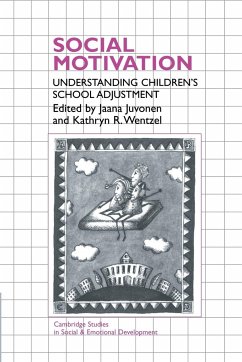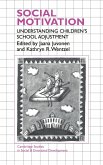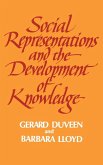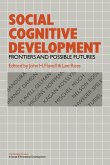Social Motivation
Herausgeber: Juvonen, Jaana; Shantz, Carolyn; Wentzel, Kathryn R.
Social Motivation
Herausgeber: Juvonen, Jaana; Shantz, Carolyn; Wentzel, Kathryn R.
- Broschiertes Buch
- Merkliste
- Auf die Merkliste
- Bewerten Bewerten
- Teilen
- Produkt teilen
- Produkterinnerung
- Produkterinnerung
Social Motivation examines the essential interaction between social functioning and success at school.
Andere Kunden interessierten sich auch für
![Social Motivation Social Motivation]() Jaana Juvonen / R. Wentzel (eds.)Social Motivation185,99 €
Jaana Juvonen / R. Wentzel (eds.)Social Motivation185,99 €![Social Representations and the Development of Knowledge Social Representations and the Development of Knowledge]() Gerard Duveen / Barbara Lloyd (eds.)Social Representations and the Development of Knowledge118,99 €
Gerard Duveen / Barbara Lloyd (eds.)Social Representations and the Development of Knowledge118,99 €![Social Cognitive Development Social Cognitive Development]() FlavellSocial Cognitive Development41,99 €
FlavellSocial Cognitive Development41,99 €![Nature and Nurture in Early Child Development Nature and Nurture in Early Child Development]() Nature and Nurture in Early Child Development117,99 €
Nature and Nurture in Early Child Development117,99 €![Piaget's Construction of the Child's Reality Piaget's Construction of the Child's Reality]() Susan SugarmanPiaget's Construction of the Child's Reality117,99 €
Susan SugarmanPiaget's Construction of the Child's Reality117,99 €![Knowing and Remembering in Young Children Knowing and Remembering in Young Children]() Knowing and Remembering in Young Children49,99 €
Knowing and Remembering in Young Children49,99 €![Conflict in Child and Adolescent Development Conflict in Child and Adolescent Development]() C. ShantzConflict in Child and Adolescent Development58,99 €
C. ShantzConflict in Child and Adolescent Development58,99 €-
-
-
Social Motivation examines the essential interaction between social functioning and success at school.
Hinweis: Dieser Artikel kann nur an eine deutsche Lieferadresse ausgeliefert werden.
Hinweis: Dieser Artikel kann nur an eine deutsche Lieferadresse ausgeliefert werden.
Produktdetails
- Produktdetails
- Verlag: Cambridge University Press
- Seitenzahl: 394
- Erscheinungstermin: 16. Dezember 2013
- Englisch
- Abmessung: 229mm x 152mm x 21mm
- Gewicht: 569g
- ISBN-13: 9780521564427
- ISBN-10: 0521564425
- Artikelnr.: 21805622
- Herstellerkennzeichnung
- Libri GmbH
- Europaallee 1
- 36244 Bad Hersfeld
- gpsr@libri.de
- Verlag: Cambridge University Press
- Seitenzahl: 394
- Erscheinungstermin: 16. Dezember 2013
- Englisch
- Abmessung: 229mm x 152mm x 21mm
- Gewicht: 569g
- ISBN-13: 9780521564427
- ISBN-10: 0521564425
- Artikelnr.: 21805622
- Herstellerkennzeichnung
- Libri GmbH
- Europaallee 1
- 36244 Bad Hersfeld
- gpsr@libri.de
1. Introduction; Part I. Social Motivation: Perceptions on Self: 2. Teacher
and classmate influences on scholastic motivation self-esteem and level of
voice in adolescents Susan Harter; 3. Self-presentation tactics promoting
teacher and peer approval: the function of excuses and other clever
explanations Jaana Juvonen; 4. Social self-discrepancy: a theory relating
peer relationship problems and school maladjustment Janis B. Kupersmidt,
Kathy S. Buchele, Mary Ellen Voeller and Constantine Sedikides; 5.
Motivational approaches to aggression within the context of peer
relationships Cynthia A. Erdley; 6. Motivational opportunities and
obstacles associated with social responsibility and caring behavior in
school context Martin E. Ford; 7. Modeling and self-efficacy influences on
children's development of self-regulation Dave H. Shunk and Barry J.
Zimmerman; 8. Commentary: goals and social-cognitive processes Carol S.
Dweck; Part II. Social Motivation: Perspectives on Relationships: 9.
Interpersonal relationships in the school environment and children's early
school adjustment: the role of teachers and peers Sondra H. Birch and Gary
W. Ladd; 10. Social goals and social relationships as motivators of school
adjustment Kathryn R. Wentzel; 11. Friends' influence on school adjustment:
a motivational analysis Thomas J. Berndt and Keunho Keefe; 12. Peer
networks and students' classroom engagement during childhood and
adolescence Thomas A. Kindermann, Tanya L. McCollam and Ellsworth Gibson
Jr.; 13. Academic failure and school dropout: the influence of peers
Shelley Hymel, Colin Comfort, Kimberly Schonert-Reichl and Patricia
McDougall; 14. Commentary: what's 'emotional' about social motivation?
Sondra Graham.
and classmate influences on scholastic motivation self-esteem and level of
voice in adolescents Susan Harter; 3. Self-presentation tactics promoting
teacher and peer approval: the function of excuses and other clever
explanations Jaana Juvonen; 4. Social self-discrepancy: a theory relating
peer relationship problems and school maladjustment Janis B. Kupersmidt,
Kathy S. Buchele, Mary Ellen Voeller and Constantine Sedikides; 5.
Motivational approaches to aggression within the context of peer
relationships Cynthia A. Erdley; 6. Motivational opportunities and
obstacles associated with social responsibility and caring behavior in
school context Martin E. Ford; 7. Modeling and self-efficacy influences on
children's development of self-regulation Dave H. Shunk and Barry J.
Zimmerman; 8. Commentary: goals and social-cognitive processes Carol S.
Dweck; Part II. Social Motivation: Perspectives on Relationships: 9.
Interpersonal relationships in the school environment and children's early
school adjustment: the role of teachers and peers Sondra H. Birch and Gary
W. Ladd; 10. Social goals and social relationships as motivators of school
adjustment Kathryn R. Wentzel; 11. Friends' influence on school adjustment:
a motivational analysis Thomas J. Berndt and Keunho Keefe; 12. Peer
networks and students' classroom engagement during childhood and
adolescence Thomas A. Kindermann, Tanya L. McCollam and Ellsworth Gibson
Jr.; 13. Academic failure and school dropout: the influence of peers
Shelley Hymel, Colin Comfort, Kimberly Schonert-Reichl and Patricia
McDougall; 14. Commentary: what's 'emotional' about social motivation?
Sondra Graham.
1. Introduction; Part I. Social Motivation: Perceptions on Self: 2. Teacher
and classmate influences on scholastic motivation self-esteem and level of
voice in adolescents Susan Harter; 3. Self-presentation tactics promoting
teacher and peer approval: the function of excuses and other clever
explanations Jaana Juvonen; 4. Social self-discrepancy: a theory relating
peer relationship problems and school maladjustment Janis B. Kupersmidt,
Kathy S. Buchele, Mary Ellen Voeller and Constantine Sedikides; 5.
Motivational approaches to aggression within the context of peer
relationships Cynthia A. Erdley; 6. Motivational opportunities and
obstacles associated with social responsibility and caring behavior in
school context Martin E. Ford; 7. Modeling and self-efficacy influences on
children's development of self-regulation Dave H. Shunk and Barry J.
Zimmerman; 8. Commentary: goals and social-cognitive processes Carol S.
Dweck; Part II. Social Motivation: Perspectives on Relationships: 9.
Interpersonal relationships in the school environment and children's early
school adjustment: the role of teachers and peers Sondra H. Birch and Gary
W. Ladd; 10. Social goals and social relationships as motivators of school
adjustment Kathryn R. Wentzel; 11. Friends' influence on school adjustment:
a motivational analysis Thomas J. Berndt and Keunho Keefe; 12. Peer
networks and students' classroom engagement during childhood and
adolescence Thomas A. Kindermann, Tanya L. McCollam and Ellsworth Gibson
Jr.; 13. Academic failure and school dropout: the influence of peers
Shelley Hymel, Colin Comfort, Kimberly Schonert-Reichl and Patricia
McDougall; 14. Commentary: what's 'emotional' about social motivation?
Sondra Graham.
and classmate influences on scholastic motivation self-esteem and level of
voice in adolescents Susan Harter; 3. Self-presentation tactics promoting
teacher and peer approval: the function of excuses and other clever
explanations Jaana Juvonen; 4. Social self-discrepancy: a theory relating
peer relationship problems and school maladjustment Janis B. Kupersmidt,
Kathy S. Buchele, Mary Ellen Voeller and Constantine Sedikides; 5.
Motivational approaches to aggression within the context of peer
relationships Cynthia A. Erdley; 6. Motivational opportunities and
obstacles associated with social responsibility and caring behavior in
school context Martin E. Ford; 7. Modeling and self-efficacy influences on
children's development of self-regulation Dave H. Shunk and Barry J.
Zimmerman; 8. Commentary: goals and social-cognitive processes Carol S.
Dweck; Part II. Social Motivation: Perspectives on Relationships: 9.
Interpersonal relationships in the school environment and children's early
school adjustment: the role of teachers and peers Sondra H. Birch and Gary
W. Ladd; 10. Social goals and social relationships as motivators of school
adjustment Kathryn R. Wentzel; 11. Friends' influence on school adjustment:
a motivational analysis Thomas J. Berndt and Keunho Keefe; 12. Peer
networks and students' classroom engagement during childhood and
adolescence Thomas A. Kindermann, Tanya L. McCollam and Ellsworth Gibson
Jr.; 13. Academic failure and school dropout: the influence of peers
Shelley Hymel, Colin Comfort, Kimberly Schonert-Reichl and Patricia
McDougall; 14. Commentary: what's 'emotional' about social motivation?
Sondra Graham.








